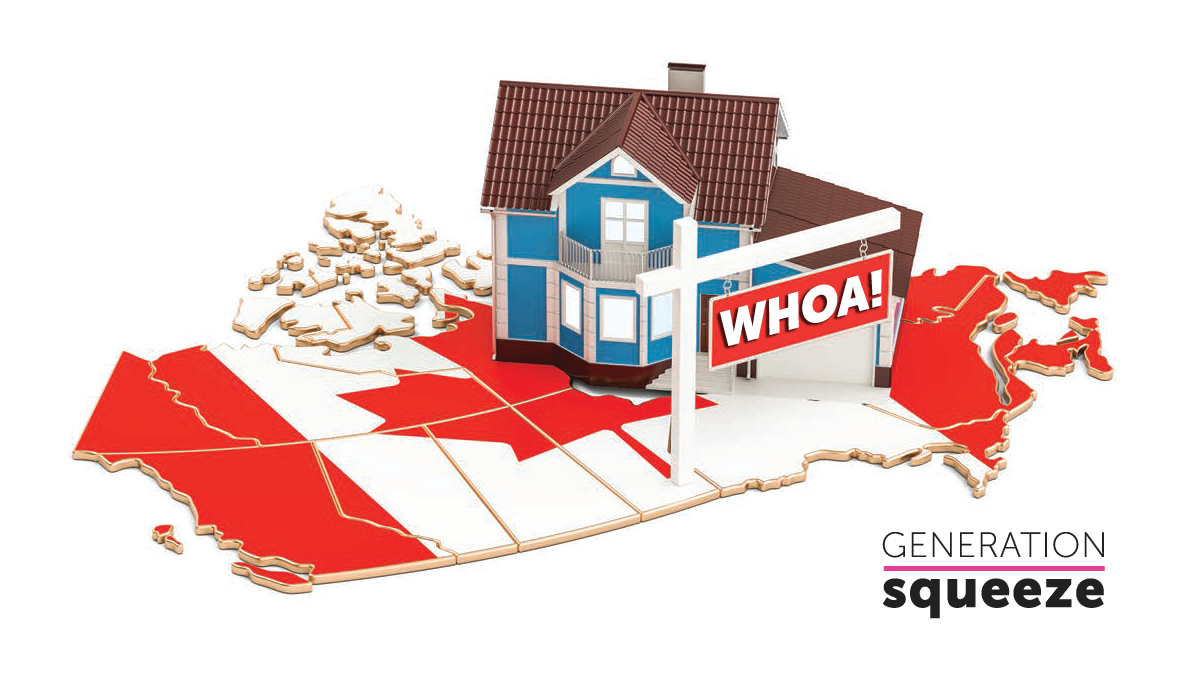Prime Minister: Home Prices Can’t Keep Rising
Why we're excited about this game-changing statement and a recent poll showing homeowners are ready to give up some wealth to improve affordability for others
"House pricing cannot continue to go up," said Prime Minister Justin Trudeau last week in London, Ontario — the first Canadian city to strike a deal with the federal government under the Housing Accelerator Fund.
“The promise of Canada...says that every generation gets to benefit from the hard work of the previous generation and succeed even more. Well for too many people, that promise of Canada seems under threat.”
In response to the Prime Minister’s statements, Generation Squeeze sent the following letter to the Prime Minister as well as all Liberal MPs. We’re curious to hear what you think about it, so please give it a read and let us know.
Prime Minister Trudeau’s comment at a recent news conference is a game changer.
Explicitly acknowledging that home prices must stall strengthens all other housing policy commitments.
Ambitious targets for building more homes do little good if we ignore the prices for which these homes will sell. Without deep subsidies funded by tax dollars, new market units will price in the rising land values that have already soared well beyond what most can afford to rent or buy with local earnings.
Publicly affirming that home prices “cannot continue to go up” acknowledges that we can no longer sustain the amount of housing wealth being extracted from our housing system by homeowners like me, and especially those who are older. This wealth is being accumulated at the cost of profound unaffordability for those who follow, including the kids and grandchildren we love.
I recently spoke at the Cabinet Retreat about the intergenerational tensions compromising our housing system. While we so often model solidarity between generations within our own families, this solidarity is eroded when rising home prices create wealth for some, and unaffordability for others. Halting the upwards spiral of home prices is a key ingredient to restore solidarity.
The Prime Minister’s game changing recognition of the need to stall housing prices is a strong foundation from which to launch a Federal Council on Generational Fairness to support ongoing federal action to build a Canada that works for all generations.
Thank you, Prime Minister and Liberal Party members, for offering this transformational housing statement. It is courageous to call out rising home prices as part of the unaffordability crisis squeezing too many Canadians – especially younger residents. It’s been years since I’ve felt this hopeful that our country really will break our cultural addiction to high and rising home prices and restore housing affordability forever.
Kind regards,
Dr. Paul Kershaw, on behalf of Generation Squeeze
Of course, our Prime Minister’s comments alone will not solve the problem, but establishing stalling home prices as a goal (as we have been recommending for years) is a significant step in the right direction. As Paul put it on BNN:
“I think something really important happened yesterday. For the first time, I actually heard our Prime Minister say out loud, in response to a question from a reporter, we don’t want home prices to keep rising. That’s never really been said before by a political leader.”
Poll: Canadian homeowners want to see prices fall
Recent polling data suggests that many homeowners who have gained big wealth windfalls from decades of escalating home prices recognize that they have won enough in this lottery of good timing in the housing market. It is time to turn attention to our children and grandkids, who will continue to lose out so long as home prices increase.
So, tell us, do you think the Prime Minster’s comments are as big of a deal as we do?









This is a very interesting discussion. I am a boomer who has benefited from purchasing a home decades ago when the earnings to owning housing ratio was reasonable and achievable. I have a daughter who ‘clawed’ into the market and has a mortgage approaching $1m - only possible to manage due to a rental apartment in the basement and roommmates.
While I do think that low interest rates contributed to rising housing prices, I think this was because we witnessed a financialization of shelter. When interest rates were low a lot of Canadians and investors purchased another property (often many) in order to increase wealth. One in seven home owners have a second property or more. Airbnb didn’t help this situation - putting long term renters out in favour of a short term high rent cash grab. When housing becomes a financial instrument rather than shelter we have a serious problem.
Additionally, governments of the past have encouraged home ownership as a type of forced savings plan - a defacto retirement plan. Again, this is a policy failure especially now that interest rates are high and mortgage amortizations are often 30 yrs long. Paying down a mortgage and thereby accruing equity is very difficult now. There will be a lot more interest paid to banks than in the past.
Canadians without generous workplace pensions (the majority of us) are reliant on that home equity as an income source in old age. Governments have counted on that. Governments have not adequately provided public pensions - CPP is under funded which explains OAS (very costly and coming from general tax revenues ie. working people) and GIS.
Having affordable access to a home or apartment whether owned or rented shouldn’t break the bank of working people. It shouldn’t be viewed as an ‘investment’ but as a basic human right.
There should be some golden rules. If average household earnings in Canada are around $80k then obtaining a modest 3 bedroom home should be 5x the avg or $400,000. Rent for a 3 bed apartment should be no more than 30% of monthly household income or $2000/mth.
Housing doesn’t just need to stabilize it needs to drop relative to income. For those already invested at a high cost it may not be possible to bring prices down as the losses would be severe - a fair concern for people like Rebecca and my daughter. But holding prices and allowing incomes to catch up (which may take a long time) may be necessary.
No matter how you slice or dice it housing is too expensive, rental is too expensive relative to Canadian incomes. Some major policy shifts in more than one sphere will be necessary if we’re ever to restore housing to what it should be - affordable shelter for all Canadians.
I think the Prime Minister’s comments were a very big deal. Finally an acknowledgement from someone in charge (and the top person no-less) that housing costs cannot continue to rise indefinitely. This sort of acknowledgment at the top is indicative of a very good thing: government is aware of the problems Canadians are facing. Our stories are getting through to the MPs. And this Liberal government is even signaling that they agree with our message. Follow those comments with policy to remove the GST from new rental construction... I would say that we have the beginnings of a potential resolution to the housing crisis. Now, I will temper my excitement with the acknowledgment that we still need to go a lot further. I think you touched on this a lot in your piece: the general idea that more housing units alone will not be sufficient unless pricing stalls. This is perhaps the only way to cause a natural correction in the housing market without a sudden and abrupt collapse: we have to address the demand side of the equation. I think that if we can make rental units widely available on a massive scale and peg those rents to income we will give Canadians what they desperately need: a choice. The freedom to live where you want and work where you live and to actually be able to pay the rent without relying on credit card debt to pay for food. That’s the dream of many Millennials and Gen Z. I don’t think that’s asking too much of our leaders at all levels of government.